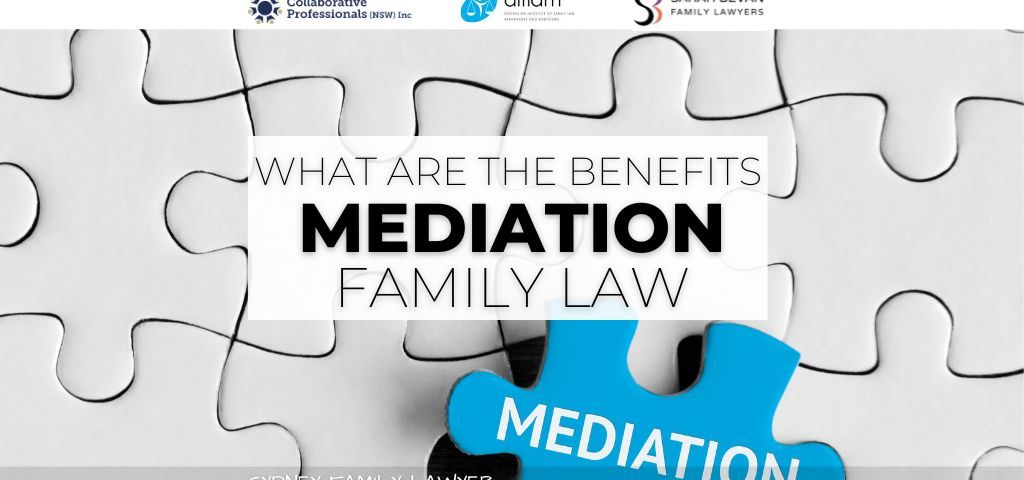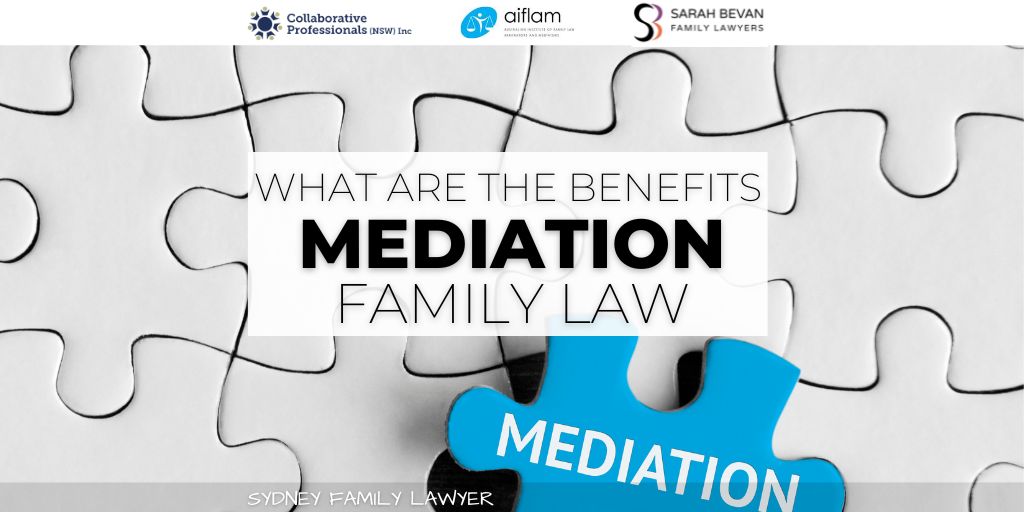- Sydney Family Lawyers
- (02) 9633 1088
- mail@sbfamilylawyers.com.au
What are the benefits of mediation in Family Law?
The idea of going to court sends shudders down most people’s spines.
We’ve all heard of some scary stories of divorce proceedings chewing up friends’ and family members hard earned money. They can often drag on and are often emotionally fuelled and cause a lot of stress for all parties.
The FCFCOA (Federal Circuit Court and Family Court of Australia) encourages the use of mediation in order to help bring about a resolution outside of court. It requires both parties to make a genuine attempt to resolve matters via mediation or alternative dispute resolution.
Mediation is seen as a more efficient and cost-effective way to resolve disputes than going to court.
It also allows the parties more control over the outcome of the dispute, as they are able to reach a resolution that is tailored to their specific needs and circumstances.
What is Mediation in family law?
Mediation in family law is a process in which a neutral third-party mediator helps couples or families in a legal dispute, such as divorce or child custody, to reach a mutually agreed-upon resolution without going to court. The mediator facilitates communication and helps the parties understand their legal options, but does not make decisions or give legal advice. Mediation can be faster and less expensive than going to court and can also help the parties maintain a better relationship in the long term.
Additionally, mediation can help the parties maintain a better relationship in the long term, especially when children are involved. Mediation can help them to co-parent and communicate more effectively, which is in the best interest of the child.
What are the benefits of mediation in Family Law?
There are several benefits of mediation in family law, including:
- Cost-effective: Mediation is often less expensive than going to court.
- Time-efficient: Mediation can be completed in a shorter period of time than a traditional court case.
- Flexibility: Mediation allows the parties to create a resolution that is tailored to their specific needs and circumstances, rather than being bound by a court’s decision.
- Control: Mediation gives the parties more control over the outcome of the dispute, as they are able to reach a mutually agreed-upon resolution.
- Confidentiality: Mediation is usually a confidential process, which can be beneficial for parties who want to keep the details of their dispute private.
- Preservation of Relationship: Mediation can help the parties maintain a better relationship in the long term, especially when children are involved. Mediation can help them to co-parent and communicate more effectively.
- Informal: Mediation is less formal than a court proceeding, which can make it less intimidating and more comfortable for the parties.
How should I prepare for mediation in Family Law?
Here are some tips on how to prepare for mediation in family law:
- Gather important documents: Make sure to bring any relevant documents, such as financial statements, property deeds, and custody agreements, to the mediation. This will help the mediator understand your situation better.
- Make a list of your goals: Before the mediation, make a list of what you hope to achieve. This will help you stay focused during the process.
- Be prepared to compromise: Mediation is a process of negotiation and compromise, so be prepared to make some concessions.
- Be open-minded: Be willing to consider different options and perspectives, even if they are different from your own.
- Be honest and direct: Be honest with the mediator and the other party about your needs and concerns.
- Think about the consequences: Before you make any agreements, think about the long-term consequences of your decisions.
- Get legal advice: Prior to the mediation, it’s a good idea to consult a Family Lawyer to understand your legal rights, options and potential outcomes.
- Hire a Mediator: If you haven’t done it yet, hire a qualified and experienced mediator to handle the process.
- Have realistic expectations: Mediation can be a useful tool, but it’s not always possible to reach an agreement. Be prepared for the possibility that mediation may not be successful in resolving your dispute.
What happens if we don’t agree at mediation in Family Law?
If the parties do not agree on a resolution during mediation in family law, there are a few options:
- Continue mediation: The mediator may suggest continuing the mediation process in order to try and reach an agreement at a later date.
- Terminate mediation: The parties may decide to terminate the mediation if they do not believe that an agreement can be reached.
- Litigation: If the parties are unable to reach an agreement through mediation, they may choose to take their dispute to court.
- Use of another dispute resolution method: They may opt for another dispute resolution method such as arbitration or collaborative law.
It’s important to note that even if the mediation does not result in an agreement, the process can still be beneficial. The parties may have a better understanding of each other’s positions and what their potential settlement options are, even if they decide to proceed to court.
Many of our Family Lawyers are also qualified Mediators and Arbitrators. If you require a consult with one of our team members, please contact us.




